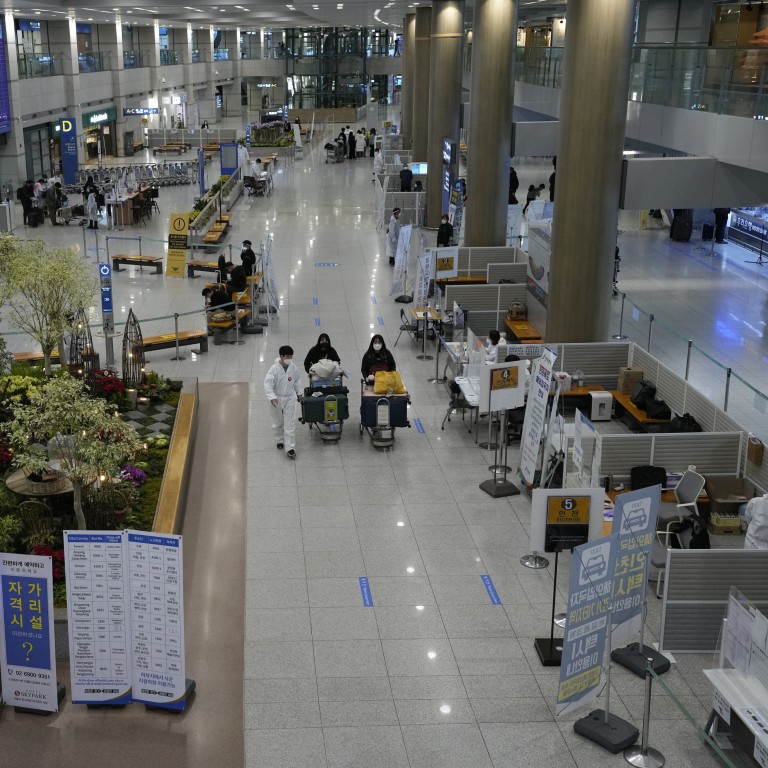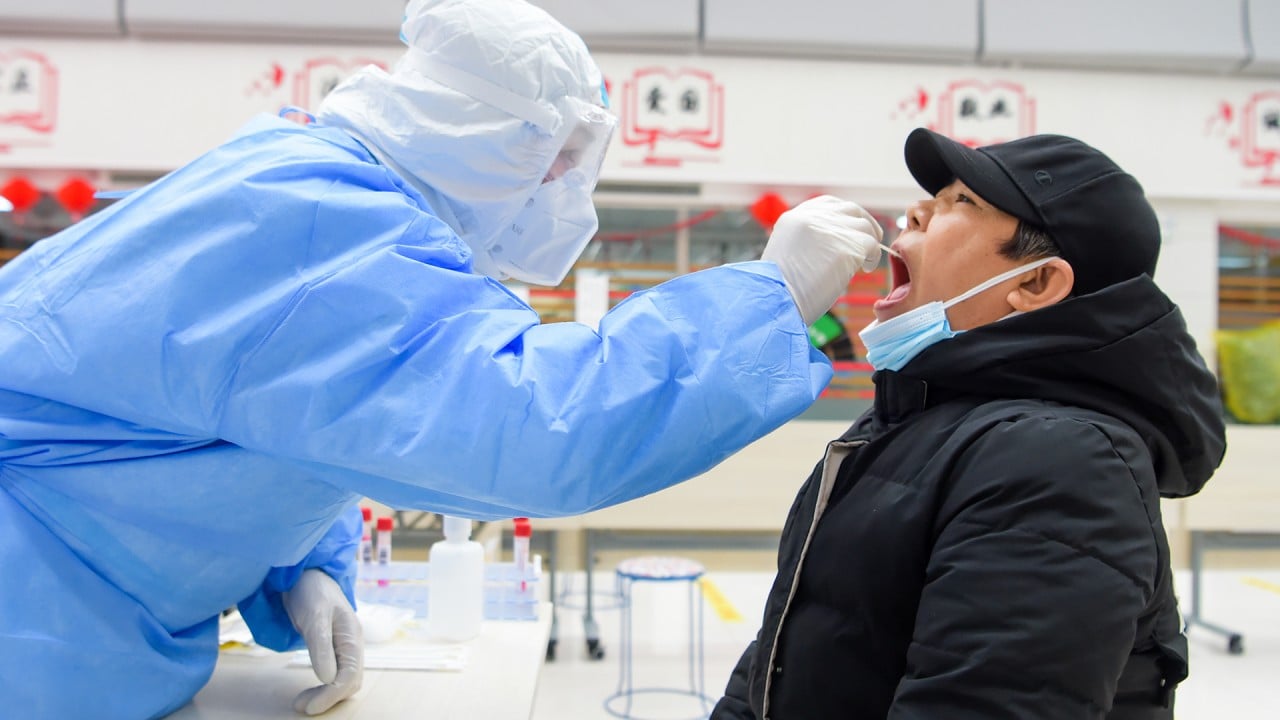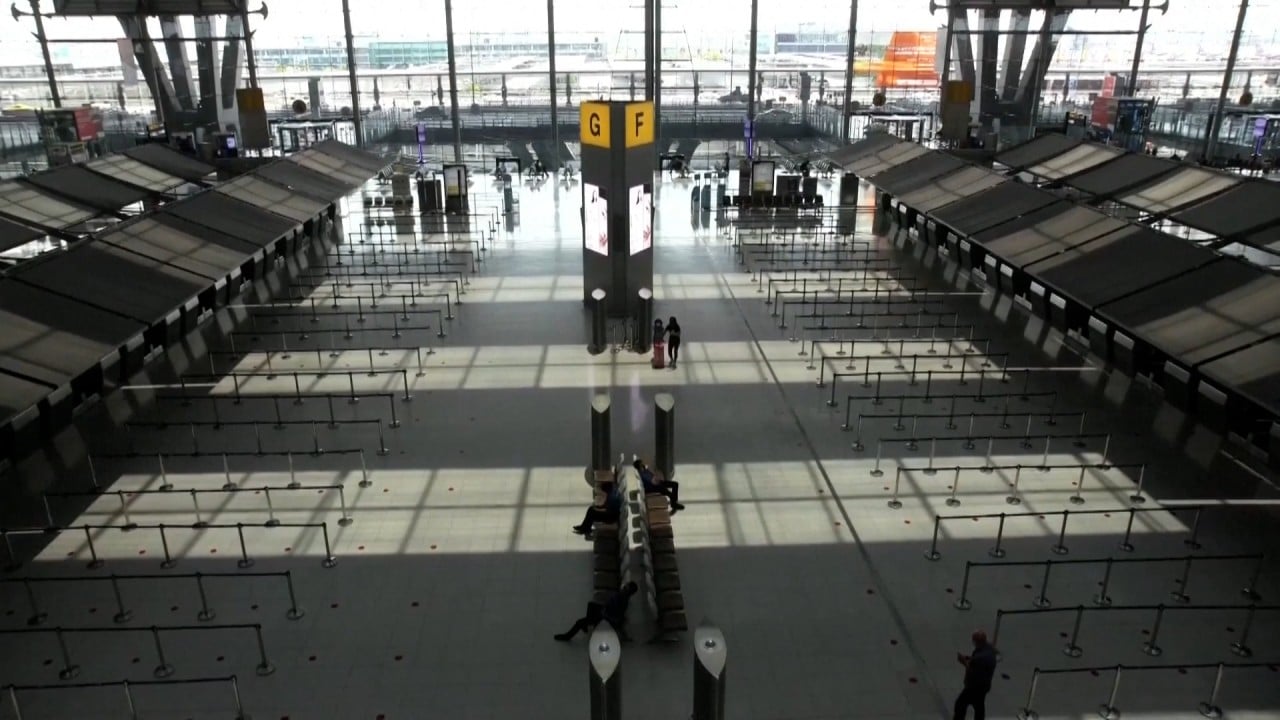
Coronavirus: India reports first Omicron cases; Japan lifts blanket ban on new flight bookings
- India said two cases were found among travellers, while Australia’s chief medical officer said there’s no proof Covid-19 vaccines don’t work against the new variant
- Elsewhere, South Korea will require a 10-day quarantine for all inbound travellers and a survey finds most Singaporeans back mandatory jabs
India on Thursday confirmed its first cases of the Omicron coronavirus variant in two people who travelled abroad, as a top medical expert urged people to get vaccinated.
The Health Ministry said the cases involved two men in southern Karnataka state who came from abroad. It did not say which country, or if they were vaccinated. Health official Lav Agarwal said all contacts of the two men have been traced and tested for the virus.
India has already classified several countries as “at risk” in response to the Omicron variant, and travellers from those countries are being tested after they arrive in India. In addition, India is testing 2 per cent of all other international travellers randomly.
Genome sequencing is also being done to detect the variant. India has tested nearly 8,000 passengers since Wednesday.
Balram Bhargava, head of the Indian Council of Medical Research, India’s top medical research organisation, urged people not to panic and get vaccinated. “Increased vaccine uptake is the need of the hour. Don’t delay in getting fully vaccinated,” he said.
What Asian countries are doing to fight the Omicron variant
Dr Chandrakant Lahariya, a health policy expert, said the focus should be on finding the unvaccinated and making sure they receive shots. “Some of the hesitancy may disappear on the news of the new variant. But this can’t be taken for granted,” he said.
Some Indian states have issued strict restrictions on international arrivals as precautionary measures, including mandatory Covid-19 tests for those coming from South Africa, Botswana and Hong Kong.
More than 56 per cent of Indians have received at least one vaccine dose – 32 per cent are fully vaccinated and 24 per cent have received a single shot, according to Our World In Data.
Australia says no evidence Omicron is deadlier
“Of the over 300 cases that have now been diagnosed in many countries, they have all been very mild or in fact had no symptoms at all,” he said.
Australia has recorded eight cases of the Omicron variant, with two of the infected individuals spending time in the community. Seven of those cases have been in New South Wales, the country’s most populous state.
Australia detects first Omicron variant cases among travellers from Africa
“Many of the cases that have been diagnosed in many countries around the world, from travellers almost exclusively from southern Africa, have been doubly vaccinated,” Kelly said. “But, again, they have not had severe disease. So we need to wait and watch and gather more information.”
Most global travel is being undertaken by vaccinated individuals, who are able to travel quarantine-free to a range of countries before the emergence of the latest strain of concern. Australia has delayed reopening plans and several countries have now tightened rules for visitors to help stem the spread of the new variant.
Japan cancels new flight bookings ban
The transport ministry abruptly said on Wednesday it was asking airlines to stop taking all new incoming flight reservations for a month, in a surprise move affecting citizens and foreign residents.
But on Thursday, government spokesman Hirokazu Matsuno said it would be amended.
“This request caused confusion among those affected and so the prime minister instructed the transport ministry to examine the issue and consider the needs of Japanese citizens hoping to return home,” he told reporters.
As a result, the ministry “asked airlines to cancel the blanket suspension of new reservations for international flights to accommodate Japanese hoping to return home”, he added.

Japan has had tight border restrictions throughout the Covid-19 pandemic, barring almost all foreign arrivals.
It had begun to ease those rules slightly last month to allow some students and business travellers entry, but reversed that decision after the emergence of the Omicron variant.
It has also barred all non-citizens from entering the country if they are coming from 10 southern African countries. All arrivals in Japan must quarantine for 14 days at home, with people coming from dozens of locations required to spend between three and 10 days of that two-week period in designated facilities.
After a summer surge in cases, Japan is registering only double-digit infections nationwide most days, and has logged around 18,360 deaths during the pandemic.
Around 77 per cent of the country’s population is now fully vaccinated, and booster shots began rolling out on Wednesday for people who received their second dose at least eight months ago.
South Korea axes quarantine exemptions
The Korea Disease Control and Prevention Agency (KDCA) reported 5,266 cases for Wednesday, a day after the daily tally rose above 5,000 for the first time amid concerns over a sharp rise in patients with severe symptoms.
South Korea will require a 10-day quarantine for all inbound travellers for two weeks starting Friday, halting exemptions given earlier to fully vaccinated people, the KDCA said.
The measure came after South Korea confirmed its first five cases of the Omicron variant late on Wednesday, including a fully vaccinated couple who arrived last week from Nigeria, followed by two of their family members and a friend.
The government is restricting arrivals from eight countries including South Africa, where the variant was first identified. It will now add Nigeria to the list, effective Friday, while suspending direct flights from Ethiopia starting Saturday, the KDCA said.
“We’re on a bumpy path toward a phased recovery of normalcy, and risks from the new Omicron variant are rising,” President Moon Jae-in told a meeting with Christian groups on Thursday.
The country has fully inoculated nearly 92 per cent of adults and is now focusing on vaccinating children and a booster programme, but experts have warned that cases could continue to rise due in part to the spread of the potentially more transmissible variant.
The number of cases has spiked since distancing curbs were relaxed last month, and the government this week shelved plans for further easing due to growing strains on its health care system from surging hospitalisation and death rates as well as Omicron concerns.
KDCA data showed the number of severe cases rose to a record 733, and 90 per cent of intensive care unit beds in the greater Seoul area are occupied, with 915 patients waiting for admission. Total infections rose to 457,612, with 3,705 deaths.
Singaporeans back mandatory vaccinations
Around seven in 10 Singaporeans believe coronavirus jabs should be required by law in the wealthy city state, according to a survey by the National University of Singapore (NUS).
The university’s Institute for Policy Studies (IPS) said that “close to 70 per cent felt that the government should make vaccination compulsory to all Singaporeans and long-term residents”.
Around 87 per cent of Singapore’s 5.45 million people have received two vaccine doses, according to Health Ministry data, with 27 per cent getting a third booster shot.
The government has already imposed restrictions on the unvaccinated minority, with bans on entry into malls and restaurants and a vaccinated-only policy lined up for offices due to reopen in January.
The survey findings come after Singapore’s worst wave of the pandemic. Of the 726 virus-linked deaths, all but 55 have occurred in the three months since September 2. Around 200,000 of the roughly 266,000 cases have been confirmed over the same period.
The survey found that satisfaction with the official response to the pandemic fluctuated over time, falling from 77 per cent in July to less than 60 per cent in October as death and case numbers peaked.
Indonesia extends quarantine
Indonesian government officials are also banned from overseas travel unless for urgent national business.
‘Unknown enemy’: Singapore tightens testing at border over Omicron concerns
Thailand wants visitors from Africa tested
There are 252 people who remain in the country after arriving from Botswana, eSwatini, Lesotho, Malawi, Mozambique, Namibia, South Africa and Zimbabwe in that period. Authorities have located 11 of them for testing.
Thailand banned all foreign arrivals from the eight African nations from Wednesday and hasn’t detected any Omicron cases.
Philippines allows boosters for all adults
The Southeast Asian nation will hold another mass vaccination campaign from December 15 to 17, after inoculating 7.6 million in the past two days. Only about a third of the population is fully vaccinated.
Reporting by Reuters, Bloomberg, Agence France-Presse, Associated Press


